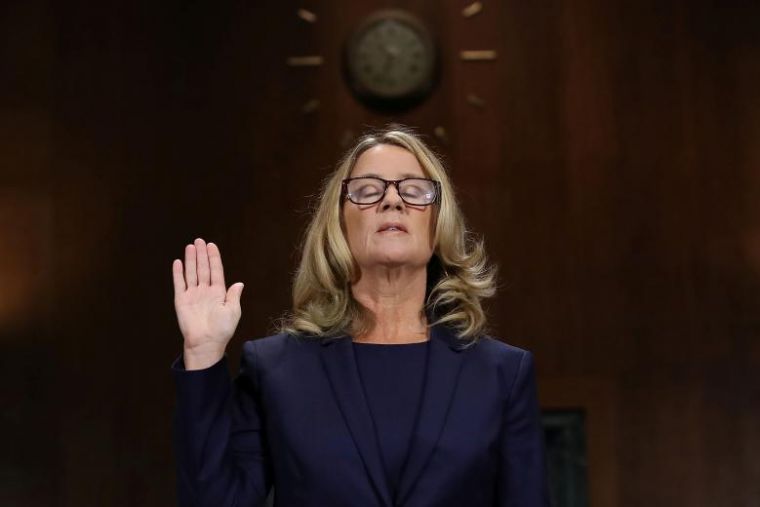'No significant change': Brett Kavanaugh, Christine Blasey Ford and America's lost art of listening
My four-year-old son is currently learning a difficult lesson. He's mastered all sort of things in his short time on earth so far. He's learned to walk, to talk, to count, to spell, to talk, to share, to brush his teeth, to talk, to ride a scooter, to dress himself, to talk and other things...mainly talking.
While he's clearly reached expert status in his own talking ability, the art of conversation is something that's taking longer to grasp. The past few months have seen us trying to help him work this out. After a week or two we'd helped him understand the necessity to use the phrase 'excuse me'. It's a simple phrase that, as adults, we're used to saying. I assume my parents taught me the same thing when I was a toddler (and I assume they had the same problems I am having with my son, who has inherited his love of his own voice from his father). It's a polite way of entering a conversation and letting those already speaking know that you'd like to say something.

He quickly got the hang of it and we, as parents, did all we could to make sure when we heard those magic words we made space to allow him to say what he needed to. It was all working very well and it was difficult not to feel a wave of smug parenthood washing over ourselves.
Sadly, as with most small victories, it wouldn't last. After a few days we realised we couldn't just stop what we were talking about every time he said 'excuse me'. Sometimes we were in the middle of important conversations, things that needed to be worked out before we could move on with what we were doing. We also realised that he'd misunderstood the power of 'excuse me' and that it wasn't a magical phrase that suddenly gave him carte blanche to begin chatting about whatever was on his mind there moment he uttered it.
It became particularly obvious a short while ago when, after saying 'excuse me', we continued to chat for a just a couple of seconds before he shouted, 'Excuse me! I said excuse me! Did you not hear me? ARE YOU EVEN LISTENING?!?!?'
Those last four words seemed to echo around the news and social media last week as a US senate judiciary committee heard from Prof Christine Blasey Ford and Judge Brett Kavanaugh. Much has been made of their testimonies, words like 'brave', 'compelling', 'credible', 'passionate', 'believable' and 'real' filling articles, news reports and tweets. Every second of their time in the chair has now been dissected and examined. Ford's composure and bravery have been praised. Kavanaugh's temperament has been questioned. The timing of the accusation has been put under scrutiny. The calls for a full investigation have been amplified.
YouGov took a poll following the hearing that asked Americans who they believed after the testimonies. Forty-one per cent of respondents said they 'definitely' or 'probably' believed Ford's testimony. Thirty-five per cent said they 'definitely' or 'probably' believed Kavanaugh. The response to the issue of lying was similar, with 30 per cent responding that they thought Ford 'probably' or 'definitely' lied during her testimony and 38 per cent saying the same of Kavanaugh.
The split along party lines was as perhaps would have been expected with 73 per cent of Democrats believing Ford and 74 per cent of Republicans believing Kavanaugh. Only 14 per cent of Republicans believed Ford and only 11 per cent of Democrats believed Kavanaugh.
It's difficult not to be disheartened by this particular result, with political loyalty being so ingrained in this whole affair. This is a story that has proved divisive in an already divided nation.
In answer to the overall question of whether people thought the confirmation should proceed, 41 per cent oppose it, 36 per cent support it. In a similar poll taken before the hearings, 80 per cen t gave the same response. And the general shape of the response to whether or not the confirmation should continue showed, and I quote, 'no significant change from our prior poll'.
No significant change. After hours of testimony, deeply personal, emotionally charged, raw, life-changing testimony. No significant change? A vote followed on the committee, the 11 Republicans in favour, the 10 Democrats opposed. 'No significant change'. A further vote looms for the 51 Republicans and 49 Democrats of the Senate. As we await a result, many expect 'no significant change'.
It makes me want to scream, like an impatient four-year-old with a lot to say: 'ARE YOU EVEN LISTENING?!?!'
But then I take stock, I think about my own opinions and biases. My political leanings, my ideological goalposts and theological red lines. I'm reminded of the times I've sat waiting for someone to finish speaking so I could 'put them right' or 'have my say'. Of the occasions when I'm not interested in learning because I'm here to teach. Of the conversations where I've barely been able to let someone finish a sentence I'd written off before they'd even started.
Sure, I might say the right polite thing, or yield some space in the conversation, but if all I'm doing is allowing someone's voice to be heard so I can tick that box of 'inclusion' or 'fairness' without actually allowing what they say to impact or enlighten me, am I really any better than a rushed hearing with an outcome no different than the one that would have reached without it?
Because when all is said and done, if we can't be moved, if we can't be persuaded, if we can't countenance the contrary, we can allow others to speak all we like – but are we even listening?
Matt White is a Northern Irish TV producer living in Essex and working in London. Follow him on Twitter @mattgwhite











